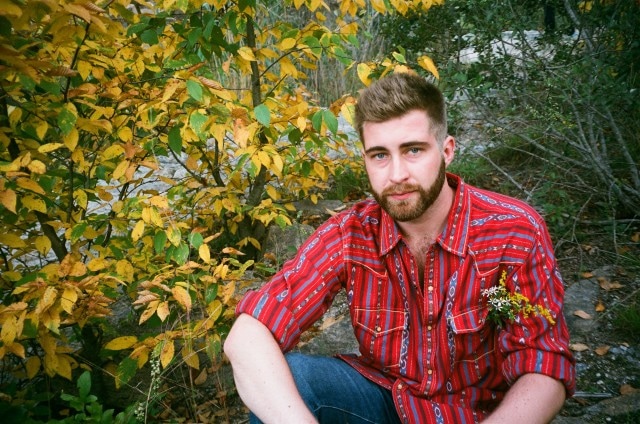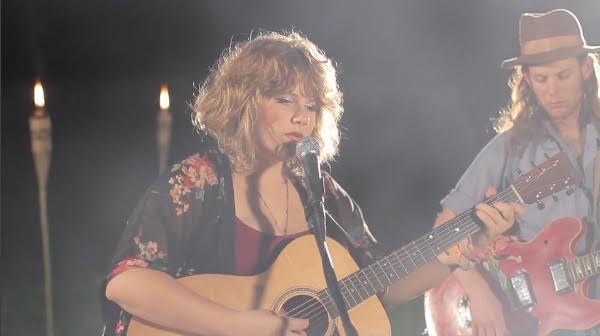|
Hayes Peebles has an adventurous palette that combines the energy of The Tallest Man on Earth with Fleet Foxes melodic sensibilities. “Airways” is an ambiguous narrative that is bridged by joyful melodic passages. With just two guitars, a tambourine and a voice, you may be asking yourself how something so bare can feel so full?
Hayes just released the Ghosts EP. Pick it up here SC: How do you imagine the howl between each verse relates to the song? Is it the sound of the ghosts? Is it sound of the wind? How do you view it working in the song? HP: It's funny, I could never find the right word for that sound, but I think 'howl' is probably it. I guess it really is the chorus of this song, though it was never meant to be. When I write, the guitar part or the progression comes first. I'll find the vocal melodies I like by singing la's or ooh's or gibberish over those progressions until something lands. Then, I replace those noises with lyrics when some sort of meaningful theme takes shape. But, when it came time to replace that howl with lyrics it just didn't feel right, so I left it. The song is not so subtly about wanderlust, movement and the way in which new environments enable folks to envision and present new versions of themselves. The howl is sort of a punctuation mark between separate instances of that release, and also a pretty visceral expression of excitement. Also, I now get to bay like a wolf in public spaces without being judged much. SC: This song changes location a lot--”confined by oceans deep and wide,” “tearing through the sky,” “dancing across the ice”, “dissolve into the brine,” etc--is the joyous/mournful howl what causes the movement? HP: The changes in location all correspond to my own travels and thoughts about those different places. The ice and brine and sky and oceans all speak to my own simple associations with countries or cities. The howl is that chapter marker that separates those places and (hopefully) reinforces the fact that this is a narrative— each verse in this song is about somewhere new along a physical, chronologically laid out adventure, though I hate the word adventure. SC: What was your writing process like for “Airways”? HP: Some songs take a really long time to come together, but this was one that got beamed down. The chords and melodies fell together in a day. I wrote the lyrics a few days later in the amount of time it takes to consume five pints of Carlsberg (it's the cheapest) and a hamburger in the Edinburgh airport. SC: How often do you write? Do you keep a songwriting schedule or do you wait to be inspired? HP: I've never kept a regular schedule. I'm not sure that I ever could. There are days when I know there's a song in me and all I have to do is sit down and let it out. Of course, for each inspired day there are three or four when writing music is frustrating- a matter of discipline, persistence and grasping at straws. It's great to write when you're feeling creative and filled with ideas, but it's important to write when you're not, to try and put yourself into a place where you can find something to sing about. SC: How does your community of songwriters influence your writing? HP: It's sort of crazy how easy it is to soak up the stuff you've been listening to and then subconsciously end up rewriting it. I think artists in all fields can relate to that and to a certain extent can't avoid it. When I'm making music I try pretty hard not to focus on what others are doing or have done. More than anything, I get the most out of listening to people who are doing their own thing—people who let their idiosyncrasies out. It's really encouraging to see that happening around me, and it gives me a reason to do the same in my own way.
0 Comments
Kristen Englenz music is like stream of consciousness Beat poetry imbued with good-down-home Southern sensibility. Kristen’s debut record Extent of Play is a lightly adorned record that gets straight to the point: a singer, an earnest acoustic guitar, and the keening of a pedal steel. “Rebound”—off Extent of Play—is a plaintive track that cuts deep. It’s a little bit Stevie Nicks, and a little bit Azure Ray and a-lot-a-bit excellent. Kristen joined me to talk about repetition, writing, and catharsis.
You can listen to "Rebound" here. SC: This is a heart wrenching song told from the perspective of someone who is the “rebound”. There’s a lot of repetition in the song--the questioning of “do you blame me?” the musicality of the acoustic guitar against the passing voicing of the pedal steel--how the speaker is “just trying to swing back for you,” and even the slight repetition of so in “I think we’re a different place so so soon”. How do you feel repetition is working in the song? KE: The lyrical repetition works in contrast to the structure of the song which is mostly through-composed and brief. The musical structure serves as the timeline of the rebound while the lyrics are the mind of the rebound person. Of course there are exceptions to this, but as a rebound you either know or find out you are experiencing something which will not repeat. It will not evolve into a romantic relationship. The bitter reality is that you are just a blip on the other person's radar. You're left in a place alone, with feelings which aren't returned, trying to process what happened while everything else including the person you were with is quite probably moving on with little thought about the event. The repetition of lyric is a mirror to the mental process of trying to come to grips with such a situation. SC: What was your writing process like for "Rebound"? KE: I actually wrote "Rebound" faster than any song I've ever written. I hadn't ever been in the sort of position of being someone's rebound. I felt like I had been duped. I remember laying down on the floor of my bedroom crying like people do (I highly recommend floor crying to anyone going through any level of heartbreak). My guitar was on a stand next to me. I sat up criss-cross-applesauce, picked up the guitar, and out came “Rebound.” I was actually doubtful of the song because of how quickly it was created, but oddly enough it tends to be most people's favorite. I think people can relate to the emotion. Rebounders unite! SC: How often do you write? Do you keep a songwriting schedule or do you wait to be inspired? KE: I write stuff down all of the time, but only 30.42% formulates into a song. People are always saying wonderfully weird and brilliant things in their day-to-day speech which I copy down. Then there’s my mind which is constantly buzzing in interpretation and observation. I was raised to trust but verify, which has seemingly turned into trying to understand every possible angle of any one thing. It's very distracting from "the moment," but notating the interesting bits can help. Rarely do I sit down with the purpose of writing a song and produce anything good. There are usually just moments when all of the words from above become accompanied by a melody and an emotion strong enough to weld a song. Writing songs is like therapy. I should probably keep a schedule and make a point to go more often, but frequently it only happens when shit gets real. SC: How does your community of songwriters influence your writing? KE: I somehow became surrounded by some of the most incredible musicians and songwriters of my generation. They've influenced me with their bravery. These are all people I feel should be playing in every household, car, and device. Unfortunately, they are not (yet), but they don't give up. That's how you know they're real in a way. They can't give up. Music is this strange, miraculous, mysterious, invisible thing. Honestly, it’s much like love. I'm lucky to call friends the people who have the courage to give themselves over to this force. To approach one's art and life this way is the material heroes are made of. I guess that's how they influence me. They inspire me to live fully, be myself, and persevere. If you do those things you cant help but live a wonderful life. Blake Rainey’s “Helicopter Rose” is a stop-and-go closer from his album released late last year on Southern Lovers Recording Co. “Helicopter Rose” punctuates an album of heart pounding and thoughtful Americana. In a sparse musical landscape Rainey drops axioms about the nature of existence: “sometimes life is a gas / sometimes it’s misery” between choruses that ooze with groove. Buy Helicopter Rose on Bandcamp.
SC: How do you view the repetition of “sometimes” throughout the song with lines like “Sometimes you find yourself in a mess, / sometimes the mess turns on you” or sometimes life's a gas, / sometimes it’s misery,” working in conjunction with the start-and-stop music in the verse? BR: It's an effect, I guess, that gives the listener pause and reason to ponder the weight of each line. The repetition of the word "sometimes" is used to get the attention of those listening so that they might pay close attention to the words that follow. SC: What was your writing process like for "Helicopter Rose"? BR: It's an unusual song for me because I don't usually write in drop D tuning with a capo, so that was a lot of fun coming up with new and interesting chords. I also wanted to write Helicopter Rose as a summation of the album’s theme—about being rescued from unfortunate situations in life. I began by comparing it to being trapped in a burning building or in a corner from making bad decisions in the past, and also to other stressful situations, and that’s when the metaphor hit me: the song should be about a gesture given to someone for helping a person in need or in a bad situation. Something like a flower you might give out during a ceremony or a celebration that represents more than just a flower. It’s a Helicopter Rose—a new word for something we all understand and sometimes need. I think it’s best summed up in this line from the chorus: Send a helicopter rose / A bird of love to rescue those / A flower of beauty to bring us all hope / A helicopter rose. SC: How often do you write? Do you keep a songwriting schedule or do you wait to be inspired? BR:I pretty much write everyday. I am always recording snippets of ideas or writing down lines whenever they pop into my head. I then schedule some time to sit down and focus on one or more of these ideas. SC: How does your community of songwriters influence your writing? BR: I'm always keeping an ear out for new songwriters and paying attention to new songs that catch my ear. There's a lot of great talent here in Atlanta and elsewhere, and I try to take in as much of it in as I can, but I also try to not take too much influence from my contemporaries. I want to stay focused trying to hone my own vision for the most part, but it never hurts to hear what others have to say. |
The Sound Connector is an online magazine for songwriters. We feature songwriting challenges, monthly interviews, and the opportunity to discover new songwriters. We are interested in all things related to the craft of songwriting. Do you want to be featured on The Sound Connector? Send us your songs!
Categories |



 RSS Feed
RSS Feed